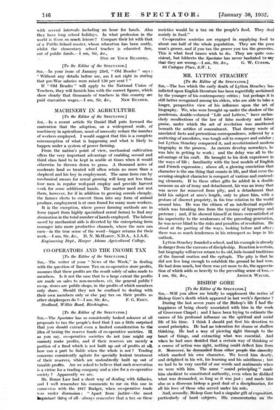[To the Editor of the SPECTATOR.] Ssa,—The Spectator has so
consistently looked askance at all proposals to tax the people's food that I am a little surprised that you should extend even a limited consideration to the idea of taxing the reserve funds of co-operative societies. IL as you say, co-operative societies do not (one might say cannot) make profits, and if their reserves are merely PI portion of a fund which is hot built up out of profits at all, how can a part be liable when the whole is not ? Trading concerns consistently agitate for specially lenient treatment of their reserves, which are undoubtedly built up out of taxable profits. Arc we asked to. believe that such reservation is a virtue for a trading company and a vice fora co-operative society ? Apparently we are.
Mr. Bonar Law had a short way of dealing 'with fallacies, and I well remember his comments to inc On this one in connexion with the 1917 Budget, when co-operative trade was under discussion -" Apart from justice—the most IsigatirLant thing of all—always remember that a tax on these
societies would be a tax on the people's food. They deal mainly in food."
Co-operative societies are engaged in supplying. food to about one half of the whole population. They are the poor man's grocer, and if you tax the grocer you tax the groceries. This is what food taxers wish to do. They are 'quite con- sistent, but hitherto the Spectator has never hesitated to say




































 Previous page
Previous page